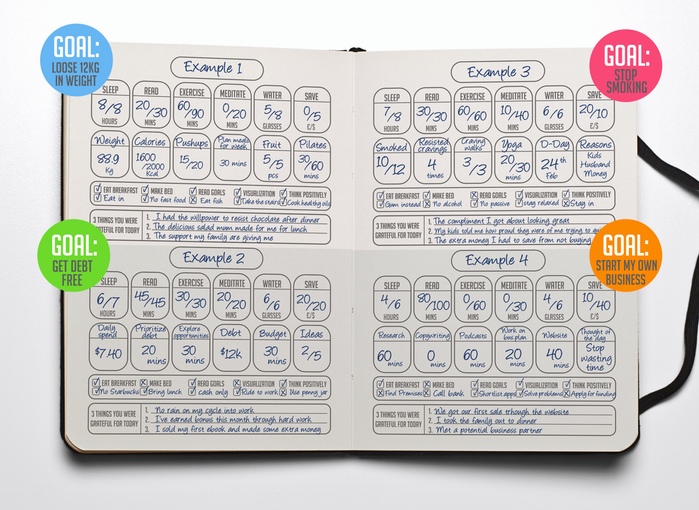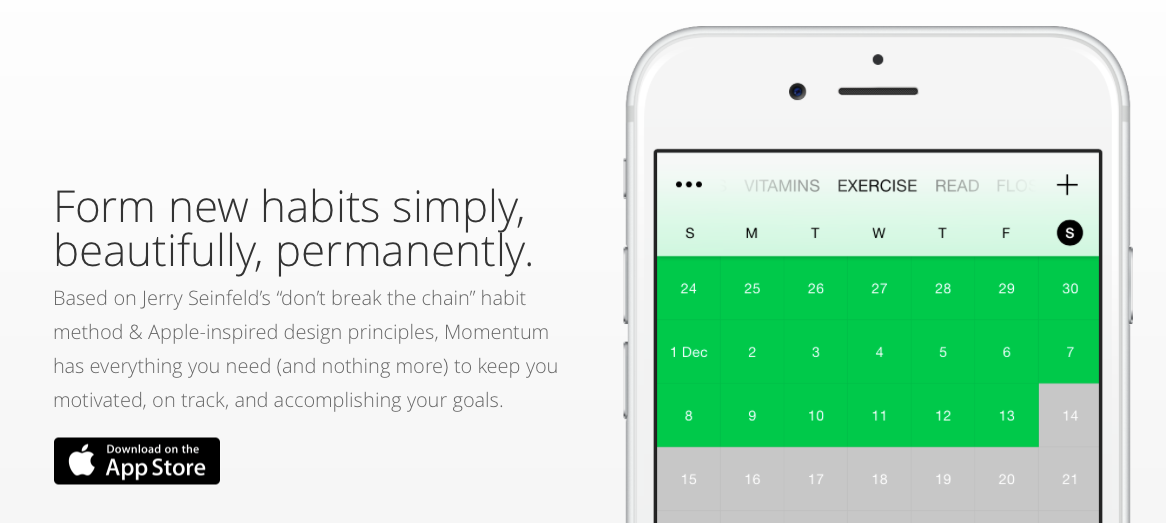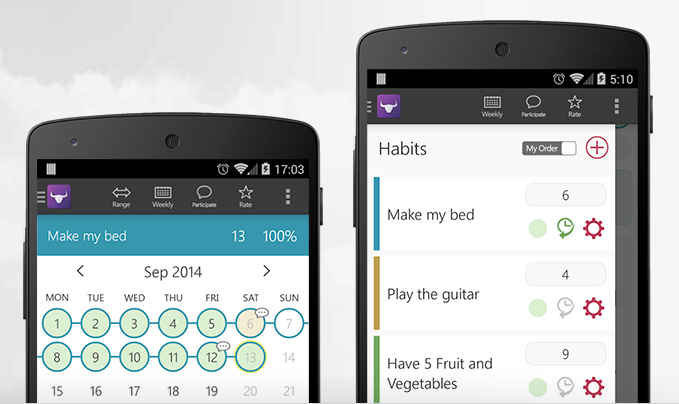01 May 2015
By Belle
Tracking your habits: why you should, and how to do it well

I’ve been tracking my habits on and off for the past couple of years. When I went through a brief stint of not tracking habits, I didn’t do a very good job of building them, either. Something about the process of checking off a habit each day and keeping a log of my progress really improves my motivation and ability to complete that habit each day.
Over time I’ve tracked habits like playing piano and practising French every day to more mundane habits like waking up early and planning for tomorrow before I go to bed.
Easily the most rewarding thing about tracking habits is when I can stop tracking because the behaviour really has become automatic—a sign of a strong habit. I read fiction every night before I go to sleep now. Six months ago I struggled to fit that in every day, but tracking it helped me to build it into a regular part of my routine.
What habits should you track?
From my own experience and a lot of research, I’ve learned some of the pitfalls of building new habits. I’ve also learned what sets me up for success when choosing a new habit to track.
When you choose a new habit to track, look for these three aspects:
Motivation
Choose a habit you care about doing regularly. Don’t worry about whether other people think it’s important. For instance, don’t try to exercise every day because you think you should. It won’t be long before your motivation for doing that habit will wane and you’ll be relying on willpower alone to get you through (not a great idea—we only have so much willpower, so you want to find a way to build habits without relying on it too much).
If you choose, on the other hand, to walk your dog every day or to play outside with your kids, those habits might come with a lot more motivation for your personally than going to the gym. And yet, they happen to include some exercise. See how that works?
Find something you’re motivated to do. You’ll need that motivation to keep you going, since habits can be an uphill battle until they become ingrained.
Regularity
The more often you do your habit, the stronger it will become. Each repetition enforces it as a behaviour and strengthens the pathways in your brain related to it. Eventually, all that repetition makes the behaviour automatic, something you do without thinking about it, which is when we call it a habit.
If you’re only doing something once or twice a week, it’s going to take a long time for that behaviour to develop into a habit. You’re spending more of your week not doing it.
Try to find a habit you can track every day, or every weekday at least. The more you do it, the faster you’ll develop it into a real habit.
Achievability
If you aim to run 5km every day after not exercising for the past two years, you probably won’t keep that up for long. To keep on track with your new habit you need to choose something achievable so you’ll always feel that if you make the effort you can do it.
The last thing you want is ability getting in the way when you’re already battling with your willpower.
If you need to choose something tiny to start with, go for it. Better a tiny habit that you do every day than a huge one you hardly ever complete.
How to build solid habits
Before you start tracking your habits, let’s talk about how you can build solid habits―that is, a behaviour that’s become automatic so you do it without thinking.
Work on one habit at a time
Focusing on several new behaviours at once will mean you can't fully focus on any one of them. You’re making things much harder for yourself if you try to build multiple new habits at the same time. Not only are you expecting too much from yourself at once, but your habits may end up competing for priority.
Say you’re working on a habit to go to the gym every morning, for instance, but you’re also trying to get 8 hours of sleep every night. What do you do when you have a late night―sleep in to get your 8 hours, or go to the gym and lose sleep? If you’d already built the habit of going to the gym, there wouldn’t be a question. You’d go to the gym without questioning yourself, because it’s a habit. When neither of your new behaviours are habits yet, they end up competing for your attention and your willpower.
Stack your habits
The best way to turn a behaviour into a habit is to use a trigger to remind yourself to do it. For instance, if you’re trying to build a habit of doing 20 pushups ever morning, you could use getting out of bed as your trigger. Every morning when you get out of bed, use that as a reminder to do your pushups.
Your trigger needs to be something you always do anyway. Getting up or going to bed work well. So do showering, brushing your teeth, or anything else you already do without thinking. In case you hadn’t noticed, these are all habits you’ve already built.
You know what that means right? As you build new habits, you create new triggers for yourself as well. If you build the habit of 20 pushups every morning, you can stack a new habit onto it. Maybe you want to do 20 sit-ups as well. Once you’ve built a stack with those two habits, you can add a third. Maybe you want to spend some time reading every morning after exercising. So now you’ve got a stack of three habits.
Each existing habit acts as a trigger to remind you to complete the next one until it becomes natural to do both together. That’s when you know you can add something new to the stack.
Build time into your day
If you complete your new habit at any time, on any day, you won’t get the advantage of familiarity that helps you get used to doing that behaviour without thinking about it.
To make your habits automatic faster, plan them into your day. Do them in the same way, in the same place, at the same time every day.
Do your pushups on the floor next to your bed every morning, right after you get up, for instance. Or exercise at 10am every weekday at the gym. This is not a hard and fast rule, but in my experience, it helps to make a habit automatic much faster if your trigger and environment are always the same.
How to keep track?
Okay, so you’ve picked a habit to work on and now you’re ready to keep track so you know how well you’re keeping up with it. How do you go about it?
It depends on what works for you. If you’re not sure, try a few different methods to see what works best.
Paper
The ol’ trusted favourite. If you use a diary or daily planner, try making a note on each day of whether you completed your habit or not. If you do a regular weekly or monthly review, this is a great time to check back through your notes to see how you’re progressing over time.

I recently backed The Habit Journal on Kickstarter which offers a focused pen and paper approach to tracking habits. But you could use a plain notebook, sticky notes, or even a whiteboard to keep a simple tally of which days you get your habit done.
Spreadsheet
If you’re a spreadsheet fiend, you can set up a simple sheet to track whether you complete your habit each day. This is a good way to make your tracking more visual so you can get an idea of a glance about how you’re going.
In fact, the app I use to track my habits was modelled on spreadsheets because they’re so simple and useful.
Mobile apps
I’m partial to tracking habits with my phone. If you want to try this too, I put together a big list of habit-tracking apps on the Exist blog.
A couple of my favourites to start you off are Momentum (iOS):

and Habit Bull (Android):

If you want some more help getting your habits going, we’ve got a list of useful articles about habit building here.
Image credits: Joshua Earle, Chris Kyle, Momentum, Habit Bull
Subscribe Keep up to date with the Exist blog. Delivered to your inbox.